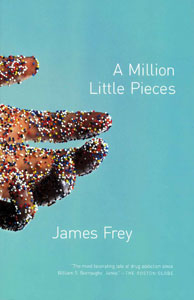The author learns that sometimes he has to put his pride aside to do the right thing.
Mood music for this post: “Ride On” by AC/DC:
[youtube=http://www.youtube.com/watch?v=CZo12LIWqYw&hl=en_US&fs=1]
One of the more unfortunate byproducts of my OCD is that I don’t like to ask for help when I need it. This flaw has taken me to the brink of a nervous breakdown many times.
When you struggle with addiction and mental disorder, you cling hard to an ego that’s always bigger than what the reality of the situation justifies.
In my warped world view, to as for help has always been to admit weakness. It’s a huge contradiction for me, because the biggest lesson I’ve learned in my 12-Step program is that nobody breaks free of addiction without help. That’s why we have sponsors to kick us in the ass.
One of the reasons James Frey was so easily exposed as a fraud over the fabrications in his book “A Million Little Pieces” was that he claimed to have overcome his demon on his own. Anyone who has been down this road knows it’s impossible to kick your most self-destructive demon without help. 
I don’t fault Frey all that much, though, because as I’ve noted before, addicts are among the best liars on the planet.
I’m no exception.
I’m a lot like the character Quint in “JAWS” in that I suffer from working-class hero syndrome. (One of the many excellent lines in that movie was when Hooper told Quint to knock of the working-class hero crap, after Quint kept picking on Hooper for not getting his hands dirty enough.)
In my case, I like to believe that adults should be able to make a living without any help from family and friends. In a financial rut? You figure it out and avoid asking your parents for help at all costs. I’ve looked down on people who have done that in the past. I described one case as someone using their father like a piggy bank.
To me, asking Dad for help means failure. I think some of that attitude comes from the fact that I leaned on my father‘s financial assistance a lot in my 20s. When my 1981 Mercury Marquis finally died a painful death at the hands of its abusive driver, I went to Dad and nagged for a new car. I got one — a 1985 Chevy Monte Carlo.
Being a cash-strapped parent on the edge of his 40th birthday, I look back on that sort of thing and realize what a burden that was on my father. When I got married and settled into my 30s, I vowed never to bother my father for money again. I would manage on my own at all costs.
For the most part, I have. In fact, until this year, Erin and I have rarely paid a bill late. Erin deserves most of the credit for this, because spending money on stupid things has always been a weak spot for me, and most of the time she has handled the bills and made it work despite her husband’s $40 fast-food binges and early-morning spending sprees on Amazon.com.
We’ve managed quite well on our own, even managing to send the kids to a Catholic school to the tune of $600 a month.
But as I’ve been noting in this diary in recent days, we’re finding ourselves in a real financial bind this year. Our story isn’t unique. The economy is in a shambles right now and most everyone we know is in a financial hole. But in our case, we finally ran out of clever ideas to keep the boat afloat.
So this week, I did something painful: I asked my father for financial help.
I spent yesterday in a real funk over it, because to me it felt like a big admission of failure. My father, God Bless him, was pretty nonchalant about it and told me not to worry. But I worried anyway. I care quite a bit about what he thinks of me, and the ability for someone to work hard, earn a living and be independent is one of the ways he measures a person. Remember that post I wrote on how being a people pleaser is dumb? Well, sometimes I’m still guilty of trying.
I’ve expressed my dismay to some friends this week, and all have told me I shouldn’t feel the way I do. One friend, who doesn’t speak to his parents, said I should feel lucky to have the kind of relationship where I can get the kind of support my father can give me.
Another friend said that I shouldn’t feel bad because when you have a family to take care of, you do what you must do for them. If borrowing money is what it takes to keep Sean and Duncan in school, that’s what I need to do, one person pointed out.
Someone else put it simply, “Family is family. You help each other out.”
As this crappy week limps to its conclusion, I am starting to absorb the lesson God had in store for me. It’s a lesson I’ve had to relearn time and time again, most recently during my road to recovery from addiction and mental disorder:
We all need help in some form.
Life is about ups and downs, and when you’re down you usually need someone to throw you a rope so you can get out of your hole.
And in the end, this isn’t failure. Erin and I made a choice over a year ago: She would leave a job she was unhappy in, and try to build a freelance editing business. She has worked her ass off, and in many ways we’ve done well. She has gotten clients and earned their respect. Until recently, we were keeping the bills paid, albeit late in some cases. We have to refine the business plan. And we need an exit strategy in the event this thing doesn’t succeed.
But we’ll get there. And we knew full well that we’d hit ruts like this.
In the end, I wouldn’t change the path we embarked on last year. Despite all this turmoil, Erin is still much happier than she was in that job. And I’m much happier than I was a couple years ago, when our money supply was a lot healthier. Back then I still had a lot of recovery ahead of me, and that led to some pretty dark periods. I’ll take this over that any day.
In the present situation, I just need to get over myself and get out of my own way. And let family help.
There are ways I can immediately pay my father back. I can keep being the best parent I can possibly be. I can continue to swing for the fences at work. And I can hold my recovery together.
Further out, I’ll have to make sure I repay in other, still to be determined ways.
For now, I did something I had to do. It sucked for me. It truly did.
But as my father used to say to me when one of my unreasonable kid requests couldn’t be met and I’d start to tantrum over it:
“Too bad.”







